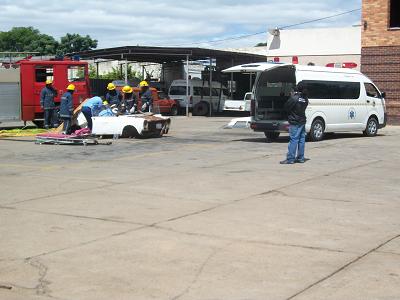Bulawayo Fire Services: The Best Zimbabwe Has
It continues to offer state-of-the-art service in ensuring safety within the second city and surrounding urban centres.
ZDDT News Correspondent recently paid a visit to Famona Fire Station to interview the personnel there and enquire about the facility’s state of preparedness. Whilst he was still on the premises, there was a “firecall” in Douglasdale and a detachment was dispatched to the scene within a minute.
The stipulated reaction time for a fire fighting team to reach the scene, within the perimeters of “Greater Bulawayo”, is ten minutes.
This revelation for the News Correspondent is living proof that the department is on top of the situation, despite the economic hitches being faced by such institutions country wide.
Above: Fire-crew showcase some of their recently acquired skills
The visit was very fruitful and eye-opening for this reporter as it revealed a lot of challenges that the fire fighting officers face on a daily basis. For instance, the force is still ill equipped and is plagued by a severe shortage of both human and material resources to effectively and efficiently execute its duties.
This, in itself, shows the dedication and commitment of the personnel of the Department.
The Fire and Ambulance Service Department is divided into three sub sections. The first section deals with training, operations and communications. The second is fire prevention and administration and the last is the ambulance division.
In the quest to establish the institution’s state of preparedness, ZDDT conducted a lengthy and wide ranging interview with the head of the Fire Prevention and Administration section, Senior Divisional Officer (SDO) Edward Mpofu.
SDO Mpofu revealed that the primary duty of this division of the rescue services is to prevent the outbreaks of fires and their related loses, as prevention is more economic and more manageable than cure.
“Our main task is to prevent or mitigate the occurance of fires and their related loses. We carry out fire risk surveys within industry, commercial and residential properties. We also inspect building plans to ensure that whatever is developed in this city complies with the Local Authority’s regulations. For example, if one wants to build a factory, we have to check the building plan to see what fire protection measures have been put in place in that development. We also carry out fire awareness campaigns throughout the city as part of our mandate as fire prevention. We have taken on a number of fire prevention activities in the 2011/2012 calendar. Other than fire awareness campaigns, we also advise the public on fire safety measures. As a department, we are saying, lets prevent those fires so that the limited resources that we have can be utilised for other areas or activities,” said SDO Mpofu.
SDO Mpofu said the division currently conducts three to four awareness programme every month. He said they could intensify the programmes if they had more resources.
To display the Department’s prowess in the field, it has been occassionally summoned to national service by way of extinguishing fires in neighbouring urban centres such as Gweru, Plumtree and Gwanda. These fire calls are always made when the respectives centres’ fire fighting department do not have the capacity to handle the intensity or extent of the infernos.
The Department is currently understaffed and has a severe shortage of fire fighting equipment. For instance it boasts of only 4 of 8 fire tenders, 2 of 3 rescue tenders, 1 of 3 foam tenders, has absolutely no light pumps (it needs 7), only 2 of 4 water carriers (these are currently off the road due to break downs), 1 in place of 3 high rise rescue kits and has only 1 portable pumps. The service has only 9 out of the required 20 ambulances.
It is also important to note that most of this equipment was bought many years ago and has outlived its lifespan. For instance, some of the fire tenders were bought in 1990. This therefore has a negative impact on the operations of the service. However, the Department has managed to prevent and control fire within the city.
A positive development has also occurred in the last two years; a charitable organisation from the United Kingdom, Operation Florian, has worked with the local Fire and Rescue Department in enhancing service delievery. The team of volunteers has been training local personnel in advanced fire fighting tecnique and skills. In addition to these invaluable training workshops, Operation Florian also donated fire fighting equipment and appliances to boost the capacity of the local team.
In this year’s training workshops, the Bulawayo Local Authority invited fire fighters from other urban centres and national institutions like the Zimbabwe National Army, Zimbabwe Republic Police and the Prison Services of Zimbabwe.
The idea was to share the knowledge imparted to our fire fighters in the rest of the country so that there is a general improvement in fire control nationwide. Operation Florian had brought a team of 13 volunteer members, which was an increase from last year’s 5 fire fighters.
In its brief interview with ZDDT recently, Operation Florian expressed satisfaction in working with Bulawayo City Council and also expressed enthusiasm in partnering with ZDDT.
Operation Florian Project Manager for Zimbabwe, Mr Anthony Burscough, said they intended to build on what has already been achieved and that the charity organisation is hoping to bring more voluntary members and more donations for appliances and equipment next year.

